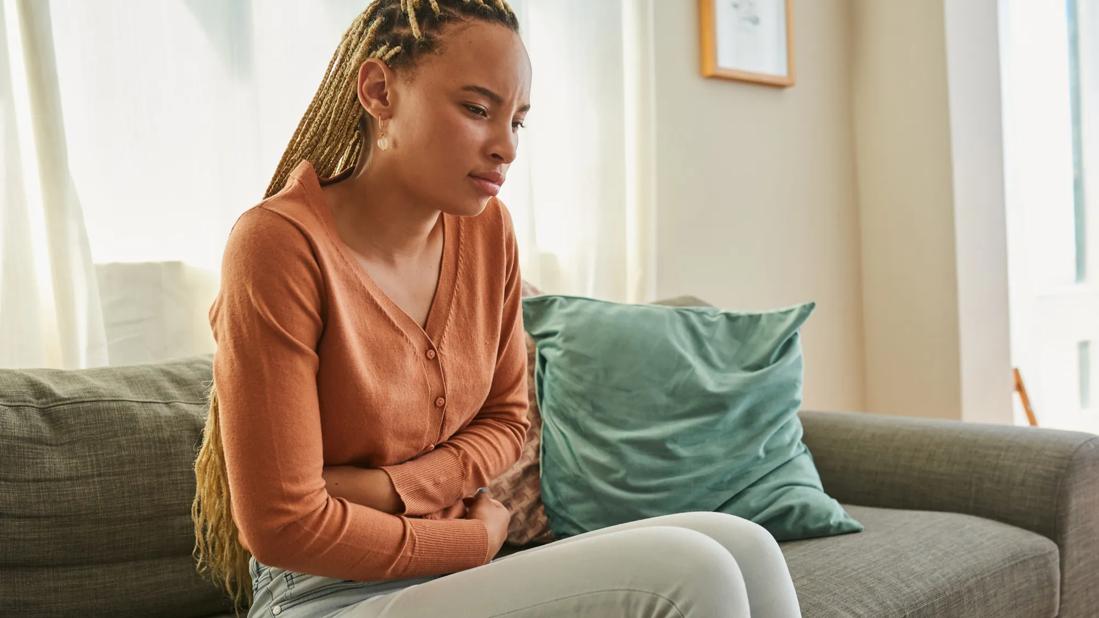Irritable bowel syndrome has many signs, but lower abdominal pain, constipation and swelling may mean you should see a healthcare provider

Image content: This image is available to view online.
View image online (https://assets.clevelandclinic.org/transform/3be88fd8-d98a-484f-8988-a7fbd116c265/person-holding-stomach-1326365676)
Person sitting on couch with arms around stomach, grimacing
If you have (or think you have) irritable bowel syndrome (IBS), you know how challenging the symptoms are to manage. And they come at the worst times, don’t they?
Advertisement
Cleveland Clinic is a non-profit academic medical center. Advertising on our site helps support our mission. We do not endorse non-Cleveland Clinic products or services. Policy
No one knows exactly what causes this abdominal discomfort, pain, bloating and sudden changes in your bowel habits. And IBS triggers aren’t always consistent and can even vary for the same person. For instance, you may eat a salad one day and feel fine, but the next day, the greens can cause an attack. For another person, milk is often a trigger.
IBS may be a bit of a mystery, but that doesn’t mean it’s untreatable.
Gastroenterologist Christine Lee, MD, breaks down what IBS feels like, what symptoms you should be concerned about and how to feel better.
In the world of stomachaches related to IBS, there are a few different sensations you can experience, including:
Advertisement
IBS goes beyond just your occasional tummy ache. Doctors diagnose IBS when someone has three or more bouts of unexplained abdominal discomfort and pain (such as bloating, cramping and diarrhea) for at least three months in a row with clear periods of no symptoms in between bouts.
The most common signs of IBS include:
If you think you have IBS or you’re struggling to manage your condition, your healthcare provider can help you avoid common mistakes and find effective ways to help manage this condition.
If you’re not sure where to start, make an appointment with a healthcare provider and express your concerns. Your doctor may order a blood test, stool samples and a colonoscopy to exclude other possible diagnoses.
IBS pain is typically felt in the abdomen, also known as your belly.
Because the abdomen covers a lot of ground in your body, the specific location and nature of your pain can vary in the following areas:
The best way to address and treat your IBS is to see a healthcare provider. You may be referred to a gastroenterologist, a specialist in digestive disorders. In some cases, you can also get help for your IBS by seeing a dietitian, who can help you develop a personalized meal plan to help reduce symptoms.
Additionally, there is more you can do to manage and relieve your IBS aches and pains on a daily basis.
“Stress, anxiety, travel, new medications and negative emotions also can make your IBS symptoms worse,” explains Dr. Lee. “That’s why it’s so important to find ways to relax or even make more significant life or job changes if needed.”
Some things to try:
Advertisement
Recognizing the signs and symptoms of IBS is crucial for managing this common yet complex condition. If you suspect you have IBS, talking with a healthcare professional is the first step toward feeling better and not letting the condition take over your life.
Together, you’ll develop a treatment plan. And, with lifestyle changes like making dietary adjustments, staying active and keeping hydrated, you’ll be able to maintain your quality of life.
Advertisement

Sign up for our Health Essentials emails for expert guidance on nutrition, fitness, sleep, skin care and more.
Learn more about our editorial process.
Advertisement
Gallstones can block bile in your biliary system and lead to pain and discomfort
Peppermint oil, exercise and a belly massage can help, but for ongoing symptoms, you may need to talk to a healthcare provider
Opt for soft foods or liquids that are rich in protein, calories and vitamins
Delivered through an IV, options can include chemotherapy, immunotherapy or targeted therapy, or a combination
Help your aching belly by staying hydrated, eating bland foods and avoiding certain foods
Hunger is the obvious cause, but food quality, and lack of protein and water are also key
Different symptoms call for different menus
Slow-to-digest food can lead to a gas buildup
Although it could be used as a moisturizer, this new trend is not recommended
Communicating clear limits helps protect your time, energy and emotional well-being
High cholesterol can be genetic, but testing and treatment can lower your heart disease risk